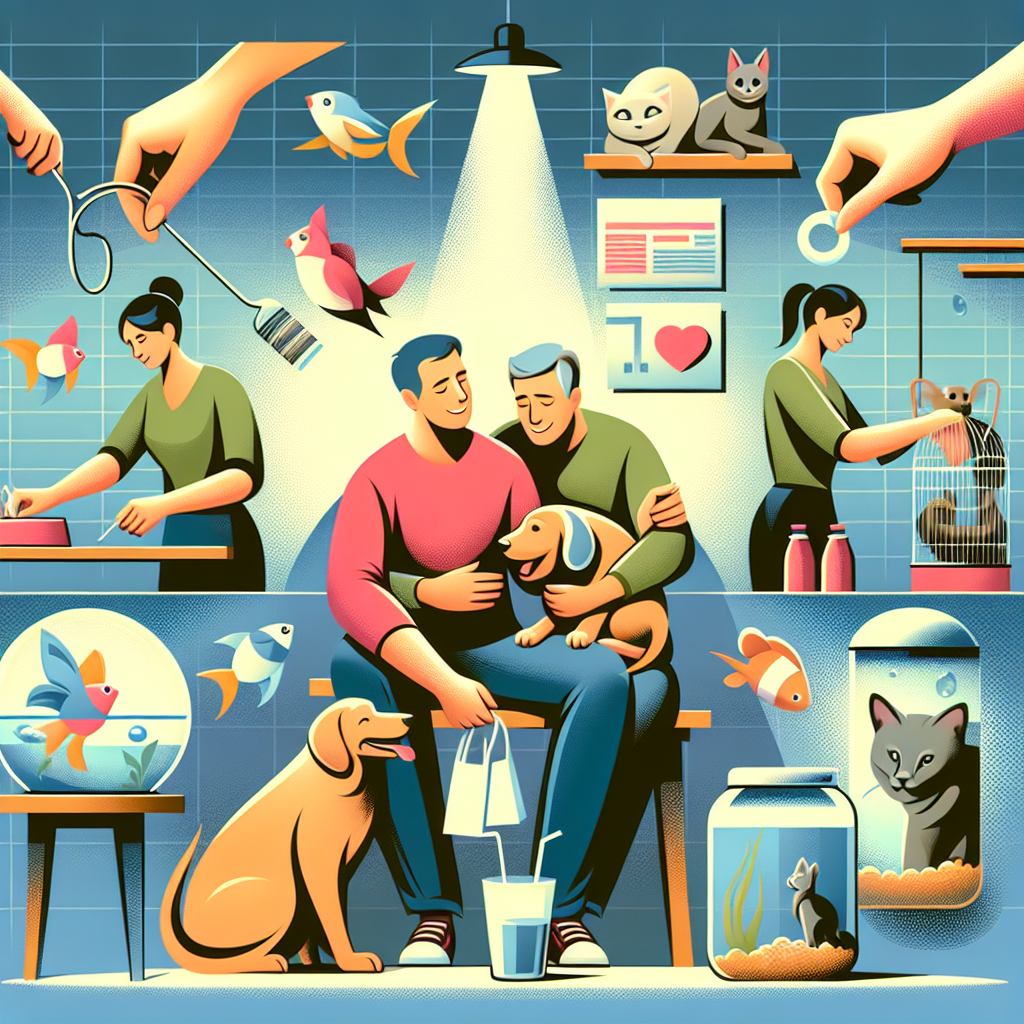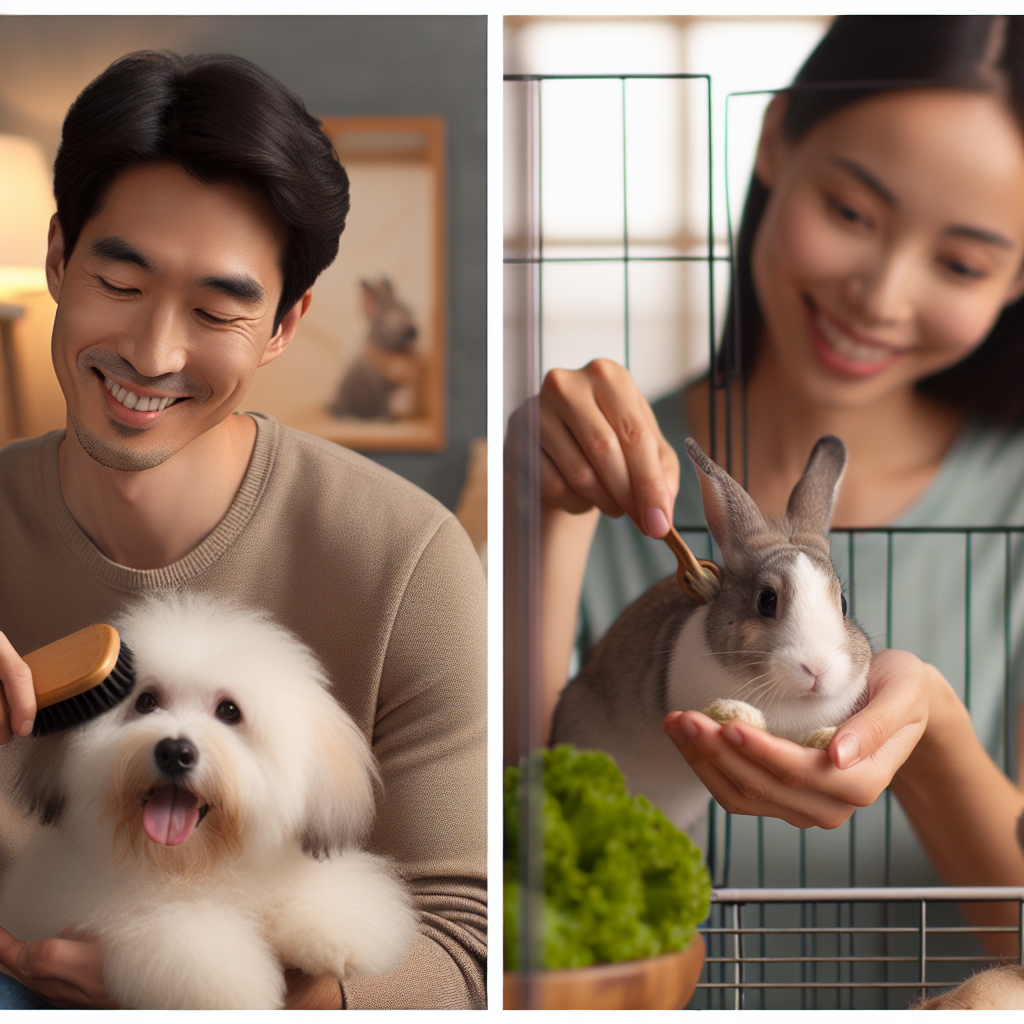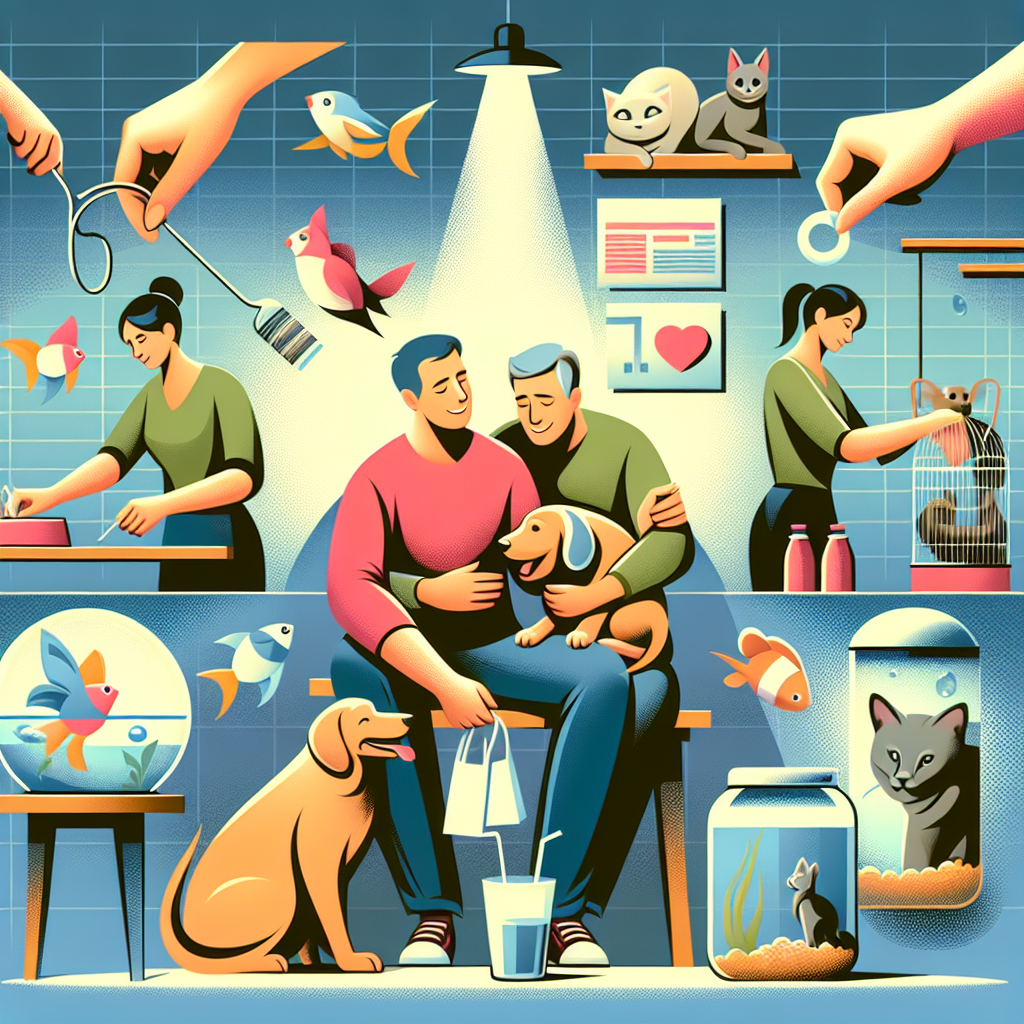Are you considering getting a pet? Before you embark on this exciting journey, it is crucial to understand the responsibilities that come with being a pet guardian. From ensuring their health and wellbeing to providing a loving environment, being responsible for a pet requires dedication and commitment. In this article, we will explore the essential duties of pet guardianship, helping you comprehend the importance and joys of caring for a furry companion.
Choosing the Right Pet
Choosing the right pet is an exciting and important decision. Before bringing a new furry friend into your life, it’s essential to research different breeds and consider their characteristics and needs. Take the time to understand the differences between various breeds in terms of temperament, energy levels, exercise requirements, and grooming needs. This research will help you choose a pet that suits your lifestyle and preferences.
Researching Different Breeds
Start by researching different breeds that align with your preferences and living situation. Consider factors such as size, activity level, and compatibility with children or other pets. Some breeds are known for being more laid-back and gentle, while others are more active and require lots of exercise. Look for breeds that fit well within your family dynamics and the amount of time you can dedicate to their care.
Considering Size and Space
The size of your living space is an important consideration when choosing a pet. Larger breeds, such as Great Danes or Saint Bernards, require more room to move around comfortably. On the other hand, smaller breeds like Chihuahuas or Yorkshire Terriers can thrive in an apartment or smaller home. Assess the space you have available and choose a pet whose size is appropriate for your living environment.
Assessing Lifestyle Compatibility
Another crucial aspect of choosing the right pet is assessing lifestyle compatibility. Some pets require more attention, exercise, and mental stimulation than others. If you have an active lifestyle and enjoy spending time outdoors, a dog might be the perfect companion. On the other hand, if you have a busy schedule but still want the joy of pet ownership, a low-maintenance pet like a cat or a fish might be a better fit. Consider your daily routine and choose a pet that fits seamlessly into your lifestyle.
Providing Proper Nutrition
Proper nutrition is vital for your pet’s overall health and wellbeing. Understanding their dietary needs, selecting high-quality food, and implementing portion control and a feeding schedule are key components of providing the best nutrition for your furry friend.
Understanding Dietary Needs
Different pets have different dietary needs based on their age, size, breed, and overall health condition. Consult with your veterinarian to determine the specific nutritional requirements for your pet. They can provide guidance on the appropriate amount of protein, carbohydrates, fats, and essential nutrients your pet needs to thrive.
Selecting High-Quality Food
Once you understand your pet’s dietary needs, it’s important to choose high-quality food that meets those requirements. Look for pet food brands that use real ingredients and avoid artificial additives or fillers. Read the labels carefully and prioritize food that lists meat as the main ingredient, as this ensures a higher protein content. Consider your pet’s specific needs, such as allergies or sensitivities, when selecting the appropriate food.
Portion Control and Feeding Schedule
Maintaining proper portion control is essential to prevent obesity and promote a healthy weight for your pet. Overfeeding can lead to weight gain and potential health problems, while underfeeding can result in malnutrition. Consult with your veterinarian about the appropriate portion sizes for your pet based on their age, weight, and activity level. Establish a consistent feeding schedule and avoid leaving food out all day to help regulate their eating habits.

Ensuring Regular Veterinary Care
Regular veterinary care is crucial to your pet’s overall health and wellbeing. Scheduling vaccinations, preventing parasites, and monitoring their overall health are essential parts of responsible pet ownership.
Scheduling Vaccinations
Vaccinations are an important aspect of preventative healthcare for pets. They help protect against various diseases and keep your furry friend healthy. Ensure your pet is up to date on their vaccinations by scheduling regular appointments with a veterinarian. Your vet can provide guidance on the appropriate vaccination schedule based on your pet’s age and living environment.
Preventing Parasites
Parasites like fleas, ticks, and intestinal worms can cause significant health issues for pets. Preventing parasites through regular preventative treatments is essential for their wellbeing. Consult with your vet about the appropriate parasite prevention methods for your pet. They can recommend treatments such as topical solutions, oral medications, or collars that effectively protect against parasites.
Monitoring Overall Health
Regular check-ups with your veterinarian are essential for monitoring your pet’s overall health. During these appointments, your vet can conduct thorough physical examinations, check for any underlying health conditions, and provide appropriate treatments or recommendations. Establishing a relationship with a trusted veterinarian ensures that your pet receives the necessary care and attention they deserve.
Creating a Safe Environment
Creating a safe environment is crucial for your pet’s safety and happiness. Pet-proofing your home, providing suitable shelter, and securing outdoor areas are important steps in ensuring their well-being.
Pet-Proofing the Home
Just like human babies, pets can be curious and get into things they shouldn’t. Take the time to pet-proof your home to prevent any accidents or ingestion of harmful substances. Keep toxic plants out of reach, secure hazardous chemicals and cleaning products, and use childproof latches on cabinets and drawers to keep potentially dangerous items away from your pet’s reach.
Providing Suitable Shelter
Every pet needs a comfortable and safe place to call home. Ensure that your pet has a suitable shelter that protects them from the elements. For indoor pets, provide cozy beds or blankets in quiet areas of the house where they can retreat and relax. Outdoor pets should have access to secure and weatherproof shelters that provide adequate protection from rain, extreme temperatures, and wind.
Securing Outdoor Areas
If you have an outdoor pet or allow your pet to spend time outside, it’s important to ensure that your yard or outdoor area is secure. Install fences or gates to prevent your pet from wandering off and potentially getting lost or injured. Regularly check for any potential escape routes or hazards that could pose a threat to your pet’s safety.

Promoting Physical and Mental Exercise
Physical and mental exercise are essential for your pet’s overall wellbeing. Daily physical activity, mental stimulation, and playtime are vital for keeping them healthy, happy, and engaged.
Daily Physical Activity
Dogs, in particular, require regular physical activity to stay in good shape and maintain a healthy weight. Take your dog for daily walks, play fetch in the park, or engage in interactive games that promote exercise. For cats, provide opportunities for them to engage in play by using interactive toys or setting up climbing structures. Remember that every pet has different exercise needs, so tailor the activities to their age, breed, and energy level.
Mental Stimulation and Enrichment
Pets also need mental stimulation to prevent boredom and destructive behavior. Provide puzzle toys or treat-dispensing toys that challenge their problem-solving abilities. Incorporate training sessions into their routine to keep their minds sharp and engaged. Cats can benefit from elevated perches or scratching posts to satisfy their natural instincts.
Playtime and Bonding
Regular playtime is not only fun but also crucial for strengthening your bond with your pet. Set aside dedicated play sessions where you can engage in interactive play, such as using feather toys for cats or tug-of-war games for dogs. Playtime not only provides physical exercise but also fosters a strong emotional connection between you and your pet.
Maintaining Proper Hygiene
Maintaining proper hygiene is an important aspect of pet care. Regular bathing and grooming, dental care, and keeping living areas clean help ensure your pet stays healthy and comfortable.
Regular Bathing and Grooming
Regular bathing keeps your pet’s coat clean and free from dirt, debris, and potential skin irritants. The frequency of bathing depends on your pet’s breed and their particular needs. Some dogs may require more frequent baths, while others with oilier coats may need baths less often. Additionally, regular grooming such as brushing their coat, trimming their nails, and cleaning their ears keeps them looking and feeling their best.
Dental Care
Just like humans, pets can develop dental problems, including plaque, tartar, and gum disease. Establish a dental care routine by regularly brushing your pet’s teeth using pet-specific toothpaste and a soft toothbrush. Dental treats or toys designed to promote good oral health can also be given to supplement your pet’s dental care routine. Regular dental check-ups with your veterinarian are important to ensure your pet’s oral health is in good condition.
Keeping Living Areas Clean
Maintaining cleanliness in your pet’s living areas is crucial for their health and wellbeing. Clean their bedding regularly to remove any dirt, hair, or allergens. Vacuum and mop the areas where your pets frequently spend time to minimize dirt and fur buildup. Regularly clean litter boxes for cats or keep outdoor pet areas free from waste to prevent odor and the spread of bacteria.
Training and Socialization
Training and socialization are key components of responsible pet ownership. Basic obedience training, positive reinforcement techniques, and introducing your pet to other animals contribute to a well-rounded and well-behaved pet.
Basic Obedience Training
Basic obedience training is essential for teaching your pet important commands and creating a harmonious living environment. Teach your pet basic commands such as sit, stay, and come using positive reinforcement techniques. Rewarding good behavior with treats, praise, or playtime helps to reinforce those behaviors and makes the training experience enjoyable for both you and your pet.
Positive Reinforcement Techniques
Positive reinforcement techniques involve rewarding your pet for desirable behaviors and ignoring or redirecting undesirable behaviors. This approach fosters a healthy and loving relationship between you and your pet. Instead of punishing your pet for misbehavior, focus on rewarding and praising their good behavior. This positive reinforcement helps to reinforce the behaviors you want to see more of while minimizing negative behaviors.
Introducing to Other Animals
Proper socialization is crucial for ensuring your pet gets along well with other animals. Gradually introduce your pet to other animals, both within and outside of your home, in a controlled and supervised environment. This allows them to learn proper social skills and develop positive relationships. Seek guidance from a professional trainer if you encounter any difficulties or if your pet displays fearful or aggressive behavior towards other animals.
Ensuring Emotional Well-being
Pets, just like humans, require emotional support and care. Understanding their behavior, providing love and attention, and recognizing signs of stress are essential for promoting their emotional well-being.
Understanding Pet Behavior
Understanding your pet’s behavior is key to meeting their emotional needs. Learn to recognize their body language, vocal cues, and specific behaviors to understand what they’re trying to communicate. This understanding helps you respond appropriately to their needs and ensures a harmonious relationship.
Providing Love and Attention
Pets thrive on love and attention, and it’s crucial to provide them with ample care and affection. Dedicate quality time each day for bonding with your pet, whether it’s through playtime, grooming, or simply cuddling on the couch. Show them love and affection through gentle touch, soothing words, and positive interactions. This emotional connection strengthens the bond between you and your pet and promotes their overall well-being.
Recognizing Signs of Stress
Pets can experience stress and anxiety, just like humans. It’s important to recognize the signs of stress in your pet, such as changes in appetite, increased aggression, excessive hiding, or excessive grooming. If you notice any unusual behavior or signs of stress, consult with your veterinarian for guidance on how to alleviate the stressors and provide a calmer and more comfortable environment for your pet.
Managing Pet Finances
Managing your pet’s finances is an essential part of responsible pet ownership. Budgeting for expenses, being prepared for emergencies, and considering pet insurance help ensure you can provide the necessary care for your furry friend.
Budgeting for Expenses
Pets come with expenses, including food, grooming, vaccinations, and routine veterinary care. Create a budget that includes these necessary expenses, as well as potential unexpected costs, such as emergency medical care. Set aside a portion of your monthly income specifically for pet-related expenses, ensuring you can provide for their needs without financial strain.
Emergency Preparedness
Emergencies can happen at any time, and being prepared is crucial. Have a plan in place for emergencies, including a list of emergency veterinary clinics and their contact information. Set aside an emergency fund specifically for your pet’s healthcare needs. Having a plan and financial resources readily available can help you handle unexpected situations with ease and provide your pet with the necessary care they require.
Pet Insurance
Consider investing in pet insurance to help cover the costs of unexpected medical expenses. Pet insurance offers financial protection in case of accidents, illnesses, or surgeries. Research different pet insurance providers, compare their coverage plans, and choose a policy that fits your budget and your pet’s specific needs. Pet insurance provides peace of mind and ensures that your pet receives the best medical care without placing a significant financial burden on you.
Dealing with Pet Loss
Saying goodbye to a beloved pet is one of the most challenging aspects of pet ownership. Knowing how to support your pet’s end-of-life journey, cope with grief, and consider pet memorials can help you navigate this difficult process.
Supporting Pet’s End-of-Life Journey
When facing a terminally ill pet, it’s crucial to provide them with comfort and support during their end-of-life journey. Consult with your veterinarian to understand your pet’s condition and discuss the available options, such as palliative care or euthanasia. Ensure your pet’s comfort by providing pain relief, gentle care, and love during this challenging time.
Coping with Grief
Losing a pet is a profound loss that can evoke strong emotions. Allow yourself to grieve and process your emotions, knowing that it is a natural part of the healing process. Seek support from friends, family, or support groups who can empathize with your grief. Take the time to remember and honor your pet’s memory, and consider commemorating their life in a way that feels meaningful to you.
Considering Pet Memorials
Pet memorials provide a way to honor and remember your beloved companion. Consider creating a memorial for your pet, such as a personalized plaque, a memory box filled with mementos, or planting a tree or flowers in their memory. These memorials can serve as a tangible reminder of the love and joy your pet brought into your life, helping you cherish their memory for years to come.
In conclusion, being a responsible pet guardian involves a comprehensive approach to pet care. From choosing the right pet to ensuring their emotional well-being, every aspect of pet care requires careful consideration. Remember to always provide love, attention, and proper care to your furry friend, and you will both enjoy a fulfilling and loving relationship for many years to come.

